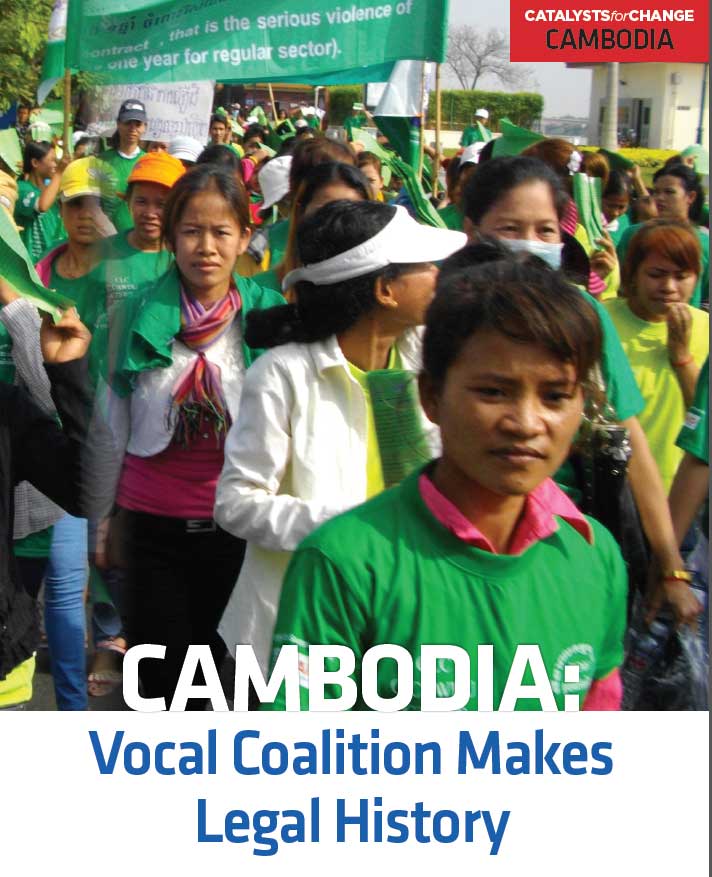
Mar 24, 2013
Cambodia’s nascent independent labor movement and human rights organizations worked to revise a labor law proposed in 2011 that would have significantly rolled back worker rights—and a Solidarity Center report describes how they did it.
English (PDF)
Arabic (PDF)
French (PDF)
Spanish (PDF)
Sources
Jan 24, 2013
Among the thousands of Cambodian garment workers who have fainted on the job over the past few years, many suffer from malnutrition, anemia and dehydration. Low wages and a relative monopoly on food canteens surrounding factories leave workers with few options for healthy food. In recent months, however, Cambodia’s garment manufacturers and unions have begun working together to urge clothing and apparel brand makers to fund one free meal for workers each day. The Solidarity Center played a key role in facilitating the agreement between the two groups.
The cost to corporations would be minimal, yet would be a big boost for garment workers, who now spend 60 percent of their salary on food, says David Welsh, the Solidarity Center’s Cambodia program director.
At a brown bag lunch at the Solidarity Center in Washington, D.C., last week, Welsh provided an update on the Solidarity Center’s work in Cambodia, where the garment industry represents 90 percent of the country’s exports and employs an estimated 357,000 workers, most of whom are women.
Garment workers received a 25 percent wage increase in the past year, says Welsh, but it has been eroded by a commensurate hike in food costs, which are high at the factory-owned cafeterias. In addition, the workers are under pressure to send much of their earnings back to their families at home. Poor nutrition is one of many factors behind the fainting incidents in Cambodia’s garment factories, according to the International Labor Organization (ILO). “Contributing factors include poor worker nutrition, excessive overtime, high heat levels, poor ventilation and mass psychogenic illness (MPI),” according to the ILO’s Better Factories-Cambodia report. Workers in factories where mass faintings have occurred say they work between 12 and 14 hours a day while being exposed to strong chemicals in hot and poorly ventilated environments. Most of the female workers said they also travel long hours standing in overcrowded trucks to get to work each day.
In addition to working to improve conditions in Cambodia’s garment factories, the Solidarity Center has been instrumental in helping local unions reshape Cambodia’s proposed trade union law. As originally drafted, the proposed law was in clear violation of every major agreement ratified by the ILO, says Welsh. The trade union law now being considered adheres closely to international labor standards and would include informal sector workers, a group not currently covered by the nation’s labor law. More than 80 percent of Cambodia’s population is younger than age 30, and 70 percent of young workers are in informal sector jobs (including irregular and non-wage jobs such as street vendors).
Welsh also reported that large-scale union organizing is taking place in industries such as construction, where workers at Cambodia’s biggest building materials factory recently formed a union. More than 100 workers restoring the nation’s historic tourist destination, Angkor Wat, also recently joined the BWTUC (Building and Construction Workers Trade Union Confederation), which is affiliated with the independent Cambodian Labor Confederation.
Jul 16, 2012
During her tour of Southeast Asia, U.S. Secretary of State Hillary Rodham Clinton urged the greater protection of worker rights, improvement of labor standards, and the empowerment of women following a private meeting in Cambodia with union leaders and labor activists.
Clinton met privately in Siem Rep, Cambodia, with 12 women union leaders—independent union representatives from every major industry in Cambodia, labor lawyers, and activists—as well as the Solidarity Center country program director, David Welsh. Friday’s two-hour roundtable, organized jointly by the Solidarity Center and the U.S. Department of State, was devoted to union and worker rights issues. Participating in the discussion were Melanne Verveer, U.S. ambassador-at-large for global women’s issues; Barbara Shailor, special representative for international labor affairs at the U.S. Department of State; U.S. Ambassador to Cambodia William Todd; and U.S. Agency for International Development Mission Director Flynn Fuller.
At the meeting, Clinton heard of the challenges faced by trade unionists in Cambodia and in particular the challenges of women workers and women union leaders. The discussion also focused on the enormous progress made by both Cambodia and the young, independent Cambodian labor movement over the last decade as well as the potential opportunities to advance both women s and workers rights under Cambodia’s prospective Trade Union law.
“Trade union rights in Cambodia were the dominant component of discussions,” the Solidarity Center’s Welsh told the Phnom Penh Post. “The U.S. delegation was clear that justice must be delivered for victims [of labor abuses].”
The Secretary pledged the continued support of the U.S. government to both the Cambodian independent trade union movement and the work of the Solidarity Center before delivering the closing address to the Lower Mekong Initiative on Women s Gender Equality and Empowerment.
In the address, Clinton commended the new trade union law, saying it “could be a model for the region. It would extend rights and protection to domestic workers. It would allow people to join unions. And if this law is passed and enforced, it will set a very strong standard for the rest of the region.”
She also emphasized the link between the promotion of trade union and worker rights with economic growth.
“The international community and international law recognize that workers everywhere, regardless of income or status, are entitled to certain universal rights, including the right to form and join a union and to bargain collectively. Child labor, forced labor, discrimination based on gender, race, ethnicity, religion, or other factors, should be universally prohibited,” she said in a speech following the meeting. “So defending these labor rights and improving working conditions is a smart economic investment, but it’s also a very important value.”

